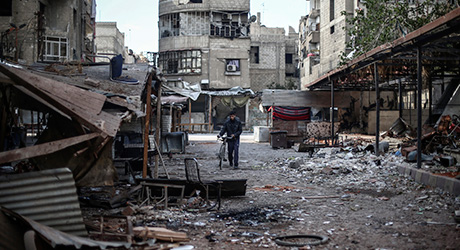Protecting the right to adequate housing during and after violent conflict
Issued by
Special Rapporteur on the right to adequate housing
Published
19 July 2022
Issued by
Special Rapporteur on the right to adequate housing
Published
19 July 2022
Issued by Special Procedures
Subjects
Conflicts and violence, Adequate housing
Symbol Number
A/77/190
Summary
This report analyses the legal, political and practical challenges to preventing, ending and responding to systematic and deliberate mass destruction of homes during violent conflict. It calls for recognizing such severe violations of international law as “domicide” – a distinct crime under international criminal law.
Special Rapporteur on the right to adequate housing
 Destroyed buildings in Douma, a city just outside Damascus, Syria. © Credit EPA/MOHAMMED BADRA
Destroyed buildings in Douma, a city just outside Damascus, Syria. © Credit EPA/MOHAMMED BADRA
Today massive violations of the right to adequate housing continue in unprecedented fashion during and after violent conflict. The attacking, bombing and shelling of civilian targets, and the destruction of entire cities and villages - displacing millions into homelessness - have continued unabated despite the development of the modern human rights and humanitarian law.
While international human rights law, international humanitarian law and international criminal law have increasingly outlawed wanton destruction of housing, forced displacement, forced evictions and other serious and large scale violations of the right to adequate housing, many conflicts have seen an alarming continuity of gross violations of the right to adequate housing. These severe violations have been largely met with impunity, entrenched housing discrimination and segregation, and have often resulted in a lack of reparation, limited options for voluntary return, and a lack of just and durable solutions.
The UN General Assembly, its Security Council and Human Rights Council, international tribunals, human rights mechanisms, including OHCHR fact-finding missions and special procedures have increased their attention to severe housing rights violations in conflict and post-conflict settings, but more action is necessary by the international community to prevent, end and overcome such egregious violations and to ensure justice and respect for human rights in post-conflict settings and reconstruction.
The report analyses the legal, political and practical challenges to preventing, ending and responding to systematic and deliberate mass destruction of homes during violent conflict. It calls for recognizing such severe violations of international law as “domicide” – a distinct crime under international criminal law – and concludes with a set of recommendations to prevent and eliminate that pervasive curse on humankind.
The report complements previous thematic reports by Special Rapporteur on the right to adequate housing concerning disasters and post conflict settings and of the Special Rapporteur on the rights of internally displaced persons on housing and land and property rights issues in the context of internal displacement.
States, UN agencies, CSOs, legal experts or any other stakeholders were invited to make concise submissions with relevant information for consideration by the Special Rapporteur to inform the report.
States
International Organizations
Civil Society Organizations and Academics